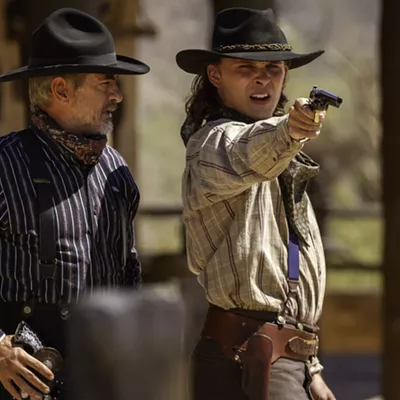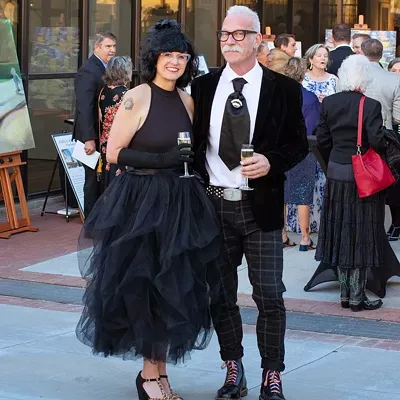They have each created a window through which they will step into the future. Composed of inspiration, frustration and collaboration, each window opens only outward. Once stepped through, it offers no means of return.
We are invited to share the rather public-yet-intimate launching of lives through windows of their own creation as 15 students studying filmmaking at the University of Arizona screen their final projects at the Fox Tucson Theatre in an event called I Dream in Widescreen.
The students are a diverse group, and the task was for each to create a seven-to-10-minute film for which they are responsible for everything from funding to postproduction. Some wrote their own screenplays, while others enlisted writers. But as the director, each is where the cinematic buck stops.
Bruce Brockman is the head of the School of Theatre, Film & Television at the university. The department of media arts merged with the theater program four years ago, and, according to Brockman, there are currently 490 undergraduates and 12 graduate students in the school. The BFA in filmmaking program usually has between 15 and 18 students in a class.
Brockman had been at the school just a year when the programs were combined, but says the confluence makes perfect sense. "We all are engaged in creating narrative storytelling. Regardless of the medium, the fundamental goal is to create a good story well told."
One of the guides for the students is instructor Lisanne Skyler, who came to the university in 2005. A writer and director working in Los Angeles, she heard of the job opening and, although she surprised herself by responding to the idea of teaching, she came and saw the students work.
"I was inspired. I was struck by the diversity of the voices, voices I hadn't heard before. I felt the students were not afraid to take chances, ready to tell it like it is; ready to put a camera in a place you might not ever think to put it. They were finding more courageous ways of telling their stories. So I thought, I had so much experience to share, I could really make an impact here."
Skyler cites one of the filmmakers in the current class, Jackie Stubbs, as an example of the kind of student that attracted her to Tucson almost a decade ago. Stubbs is "a young Korean-American woman who had a rather complex relationship with her mother, who hadn't returned to Korea in many years. Jackie had never been there," Skyler says. Gaja is a personal documentary about the two as they visit Korea. A documentary can fall into the trap of not remembering that it is visual medium, Skyler says. "But Jackie chose to create a very observational film and put the audience in Korea." What results is a film that has a "visceral" quality, a difficult achievement for a young documentarian.
Stubbs says her interest in documentaries originated at Desert View High School under the mentorship of instructor Brenda Semanick.
The idea of going to Korea was sparked by "intuition," or "a little voice which said, you need to take your mother to Korea. It seemed a little lofty or ego-oriented but it felt like I was being guided, so I better listen."
Actually, just being able to finish her degree is an accomplishment for Stubbs. She had to leave school in her junior year because of a lack of funds. In fact, she was homeless. But she began realizing the importance of filmmaking to her, and when she became aware that financial aid was available for homeless youth, she pursued that prospect and was granted money to help her finish school. She plans to move to Los Angeles and hopes to find ways to continue her training. She wants to be a cinematographer.
So if students have to find their own film funding, how did Stubbs manage a trip to Korea?
"They are very resourceful," Skyler says, laughing. "We provide equipment, but all of the students work together very closely, so they are all helping each other out. It results in very confident filmmaking."
In fact, almost every student interviewed cited the value of collaboration and the strength of friendships and community as the greatest resources they will take with them.
Roxanna Ferenz, from Queen Creek, says all the students are passionate about their ideas and their work, but they must "partner up" and work out their creative differences. Her film, Daydream, represents "the accumulation of a personal story." She would like to be a production designer, who is in charge of "everything that people see" in a film.
Tucson native Andrew Katsinas threw caution to the wind when developing his film, Spatial Recognition. It's a comedy based on an idea that arose "a couple of years ago" when he and a few of his friends chatted about planets having personalities. A product of Catalina Foothills High, he has interned in L.A. with a film company and was a bit alarmed at "a different breed of people" totally focused on careers and money. He's headed to L.A., but not for a few months yet; he's saving money from his job as a server.
The script for Alexis B. Preston's film, One Foot In, was the result of an all-nighter. "I just waited too long," she says. But the story works well, and comes with a few surprises. "It was a tough shoot," she says, because it features dialogue that takes place in a moving vehicle. "We had just three days and we had to rethink everything."
The screenings at the Fox have become quite an event. A jury of established film folks critiques the work, and awards will be presented.
And after the windows have opened? Skyler says, "I hope they take away the confidence to feel that they have something to contribute to an exciting and constantly changing industry. Be patient. Don't take yourself out of the mix because the first couple of things didn't work."







